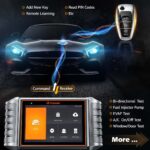The Joying Android head unit, powered by the Snapdragon chip, offers a range of features including Bluetooth connectivity. While primarily designed for pairing with phones, recent updates have expanded Bluetooth functionality, allowing connection with OBD2 adapters for vehicle diagnostics. This article explores Joying Bluetooth Obd2 compatibility, common issues, and troubleshooting tips.
Connecting Your Joying Head Unit to an OBD2 Adapter
Joying head units traditionally limited Bluetooth pairing to phones. However, a recent firmware update introduced a “normal pairing” option, enabling connection with other Bluetooth devices, including OBD2 adapters. To connect your Joying head unit to a Bluetooth OBD2 adapter:
- Enable “Normal Pairing”: Navigate to the Bluetooth settings on your Joying head unit and ensure “normal pairing” is activated. This option may be labeled differently depending on your specific firmware version.
- Put OBD2 Adapter in Pairing Mode: Plug the OBD2 adapter into your vehicle’s OBD2 port and put it into pairing mode. Refer to the adapter’s manual for specific instructions.
- Scan for Devices: On your Joying head unit, initiate a scan for available Bluetooth devices.
- Select and Pair: Select your OBD2 adapter from the list of discovered devices and enter the pairing code if prompted (usually “0000” or “1234”).
Troubleshooting Joying Bluetooth OBD2 Connection Issues
While the “normal pairing” update has improved compatibility, some users still experience issues connecting their Joying head unit to a Bluetooth OBD2 adapter. Common problems include:
- Failure to Pair: The head unit may not detect the OBD2 adapter or the pairing process may fail. Ensure both devices are in pairing mode and within range. Try restarting both the head unit and the OBD2 adapter.
- Intermittent Connection: The connection between the head unit and the adapter may drop frequently. This could be due to interference from other Bluetooth devices or a weak signal. Try minimizing interference and ensuring a clear line of sight between the devices.
- Incompatible Adapter: Not all Bluetooth OBD2 adapters are compatible with Joying head units. Check the adapter’s specifications and user reviews to confirm compatibility with Joying devices. Some adapters may require specific software or apps to function correctly.
- Outdated Firmware: An outdated Joying head unit firmware can cause compatibility issues. Ensure your head unit is running the latest available firmware. Refer to the Joying website or forums for update instructions.
Optimizing Your Joying Bluetooth OBD2 Experience
For optimal performance:
- Choose a Compatible OBD2 Adapter: Opt for an adapter specifically designed for compatibility with Android head units. Research and read reviews before purchasing.
- Close Unnecessary Bluetooth Connections: Disconnect other Bluetooth devices that are not in use to minimize interference.
- Position the OBD2 Adapter: Ensure the adapter is positioned for optimal signal strength, avoiding obstructions and metallic surfaces.
Conclusion
Connecting a Bluetooth OBD2 adapter to your Joying head unit can provide valuable vehicle diagnostic information. While some compatibility challenges may exist, following the troubleshooting tips outlined above can help resolve common issues. Remember to keep your Joying firmware updated and choose a compatible OBD2 adapter for the best experience.
